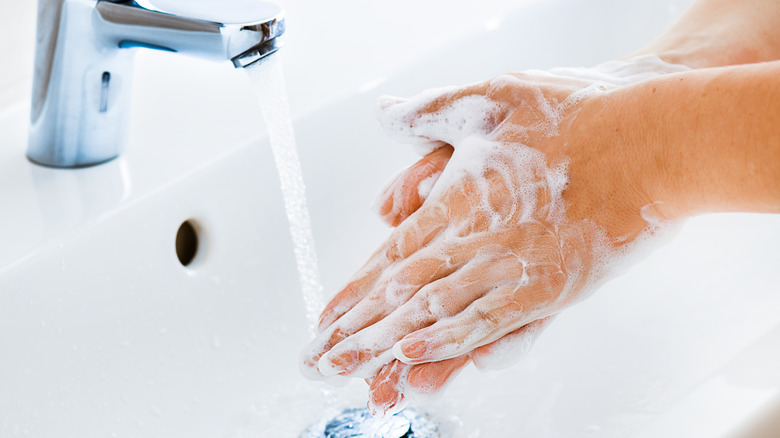This Is What You Can Do To Prevent Pink Eye
If you've ever experienced the redness and scratchy irritation of the eye that are symptoms of pink eye, you're not alone. It happens to three to six million children and adults in the United States each year (via Cleveland Clinic).
Interestingly, "pink eye" is not actually an official medical term (per WebMD). The condition is technically known as "conjunctivitis," which refers to inflammation of the conjunctiva (the clear tissue that covers the white part of the eye and the inside of the eyelid). The Cleveland Clinic notes that when the tiny blood vessels in the conjunctiva become irritated and inflamed, they become more visible, which is what causes the 'pink' color on the eye.
The inflammation can have a number of different causes and can occur in one or both eyes. Viruses account for most cases of pink eye, but the condition can also be caused by bacteria, allergens, or irritants. If the infection is viral, in most cases it will get better on its own in a week or two with no treatment (via National Eye Institute). If it is caused by a bacteria, the symptoms often clear up within just a few days, but could linger for two weeks or more. Antibiotics may help speed up the healing time. For conjunctivitis caused by allergies, treatment involves removing exposure to the allergen and using allergy medication or eye drops if necessary. In the case of an eye irritant, washing the eye out with water for several minutes should help.
Pink eye caused by a virus or bacteria is contagious
Viral or bacterial pink eye is contagious, and prevention involves the same hygiene strategies that are used for preventing the spread of any other viral or bacterial infection. Washing hands frequently, not touching the eyes, and not sharing items that touch the face or eyes, like towels or eye makeup, are important steps. Also, sorry to say, but any eye makeup that touched the affected eye should be tossed, according to Mayo Clinic.
Since the viruses and bacteria that cause pink eye are spread through direct contact, ophthalmologist Rishi P. Singh told Cleveland Clinic that "If you're a parent and your child has bacterial or viral conjunctivitis, it's best to keep them home from school, daycare or gathering with friends until the danger of being contagious is over."
While most cases of pink eye are mild and will go away on their own, it's important to see a doctor if symptoms persist or get worse, or if you experience pain, blurry vision, or other more serious symptoms. Ivan R. Schwab, MD, clinical spokesperson for the American Academy of Ophthalmology, adds, "if you have pain and decreased vision, that's a sign that you need to see your ophthalmologist," (via Insider).


